Rifqi Maulana´s journey into coffee began on Flores Island in 2019, where a cup alive with citrus and apple notes shifted his idea of what coffee could be. What started as a small micro-roastery project during the pandemic has since grown into a career spanning brewing, roasting, sourcing, and exporting.
Today, Rifqi is Head of Roasting at Hermanos Colombian Coffee Roasters in London, overseeing production and sourcing while also running Dawn Coffee Curators, a venture linking smallholder producers in Indonesia with UK roasters. For Rifqi, each role connects back to the same goal: honouring producers and bringing their coffees to a wider audience.
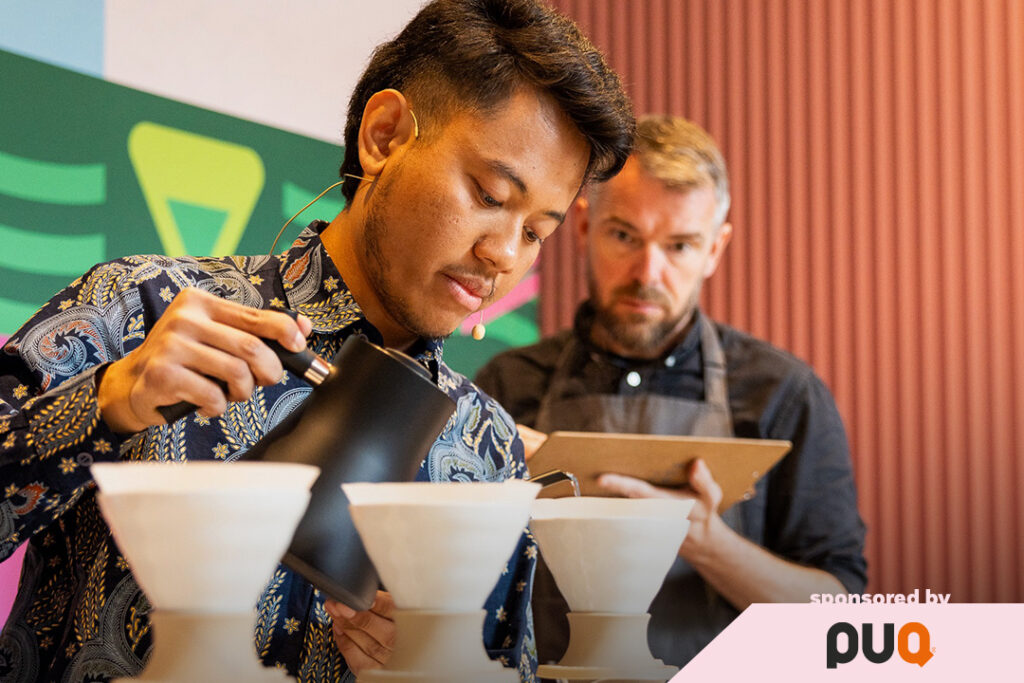
Rifqi, what is your first memory with coffee?
It’s probably too far back to recall my very first memory of coffee. Growing up in Indonesia, coffee was always around in one form or another. But when it comes to specialty, my earliest memory is crystal clear.
In 2019, I took an overland work trip across Flores Island, a place better known internationally for Komodo Dragons than coffee. I visited three coffee-producing regions: Ruteng, Wae Rebo, and Bajawa, and it was there that everything changed for me. I remember sitting down for a cup, taking a sip, and suddenly tasting citrus and apple in black coffee for the first time. No sugar, no syrup, just pure, vibrant flavour. It completely shifted my understanding of what coffee could be.
Even more powerful, though, was realising how deeply coffee was woven into the daily rhythm and culture of the people there. That trip was the spark that set me on the path I’m still walking today.
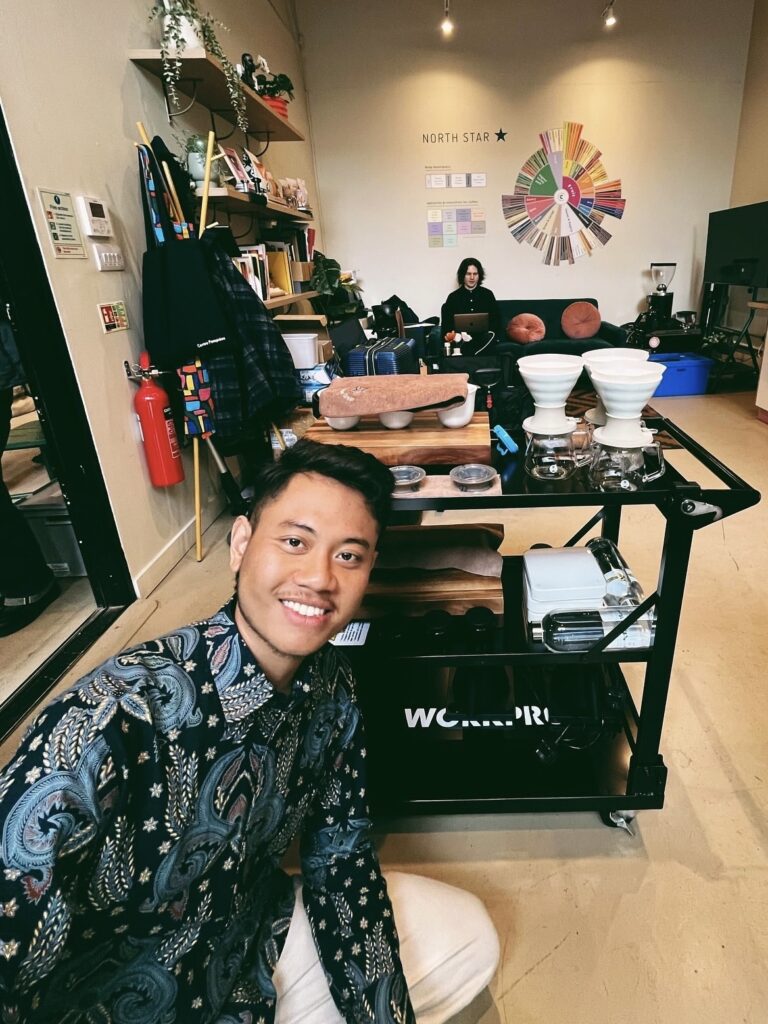
What inspired you to pursue a career in the coffee industry, and how did you get started? What did you do before coffee?
The spark from Flores stayed with me, but the real push came during the COVID-19 pandemic. At that time, home brewing was booming across Indonesia, and together with a couple of friends, I decided to start a small online micro-roastery. We began with drip coffee bags, an approachable way to bring better coffee into people’s homes.
My background before coffee was in the creative industry. I worked in an agency, and those connections turned out to be invaluable. They gave me access to baristas and roasters who generously shared their knowledge, and they helped me understand branding, storytelling, and how to connect with an audience. On the practical side, we were fortunate to be in Indonesia, where sourcing coffee directly from farmers was possible and accessible. That gave us both authenticity and flexibility.
The roastery grew from online retail into supplying cafés, and eventually, we began receiving inquiries from overseas, first Singapore, then Hong Kong. Suddenly, what began as a small lockdown project was opening doors to exporting coffee. That was the moment I realised I wanted to dive deeper, not just into brewing and roasting, but into the entire coffee value chain.
This path ultimately led me to London. I was awarded a scholarship to study a master’s degree at Bayes Business School, where I specialised in entrepreneurship and international business. It was a big leap, but it gave me the global perspective I needed. My journey into coffee wasn’t a straight line, but looking back, every step feels connected: from origin, to roasting, to exporting, and now to where I am today.
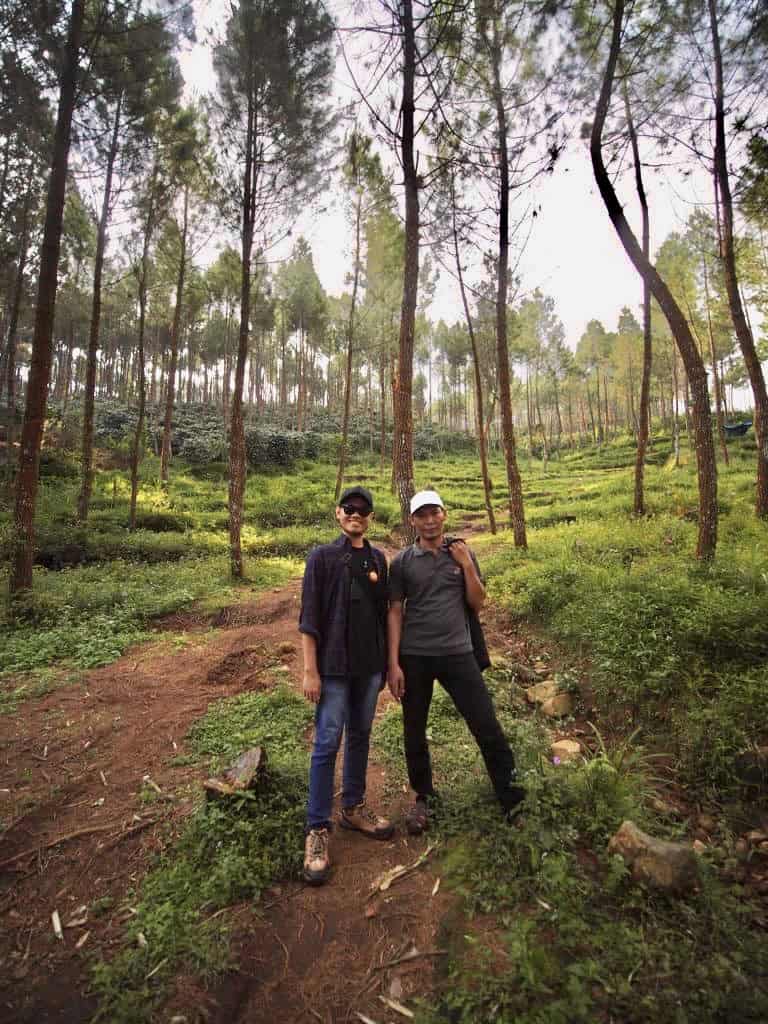
Tell us a bit about the place you work at. What is your role there?
At Hermanos Colombian Coffee Roasters, I’m the Head of Roasting. Hermanos is an independent, UK-based specialty roastery with ten coffee shops across London. What makes us unique is that all of our coffees are sourced directly from Colombia. My role is to manage the daily production roasts, oversee quality control protocols, and source coffee with our green buyer in Colombia to ensure quality across the lineup.
At the same time, I run Dawn Coffee Curators, a green sourcing venture I founded to connect smallholder producers in Indonesia with roasters here in the UK. Our focus is on traceability and on shining a light on underrepresented origins, particularly from Java and Sumatra. It’s a personal project that bridges my roots in Indonesia with my current life in London.
What kind of experience do you want your customers to have when they try your coffee?
Most of my work happens behind the roaster rather than behind the bar, so I don’t always get to see customer reactions directly. For me, the most rewarding part of this job is knowing that somewhere, someone is enjoying a cup I roasted, whether it’s in one of our cafés or brewed at home after an online order.
What I hope they feel is care and connection. Coffee travels such a long journey, through so many hands, farmers, pickers, millers, exporters, and roasters. My role is to honour all of that work by roasting in a way that respects the origin and brings out its unique character.
If a customer tastes a floral Gesha from Colombia or a fruity coffee from Sumatra and feels that there’s a story in the cup, then I feel I’ve done my job.
What is your favourite part of the day at work, and why?
My favourite moments aren’t tied to a daily routine but to the times when I get to travel to the origin. Standing on a farm, meeting the producers, then cupping coffees right there, in the place where they were grown, that’s when coffee feels most alive to me.
Later, when I roast or present that coffee back in London, it feels like carrying a piece of that landscape and those people across continents. Those moments remind me why I do what I do: to honour the producer’s work and carry their story into every cup.
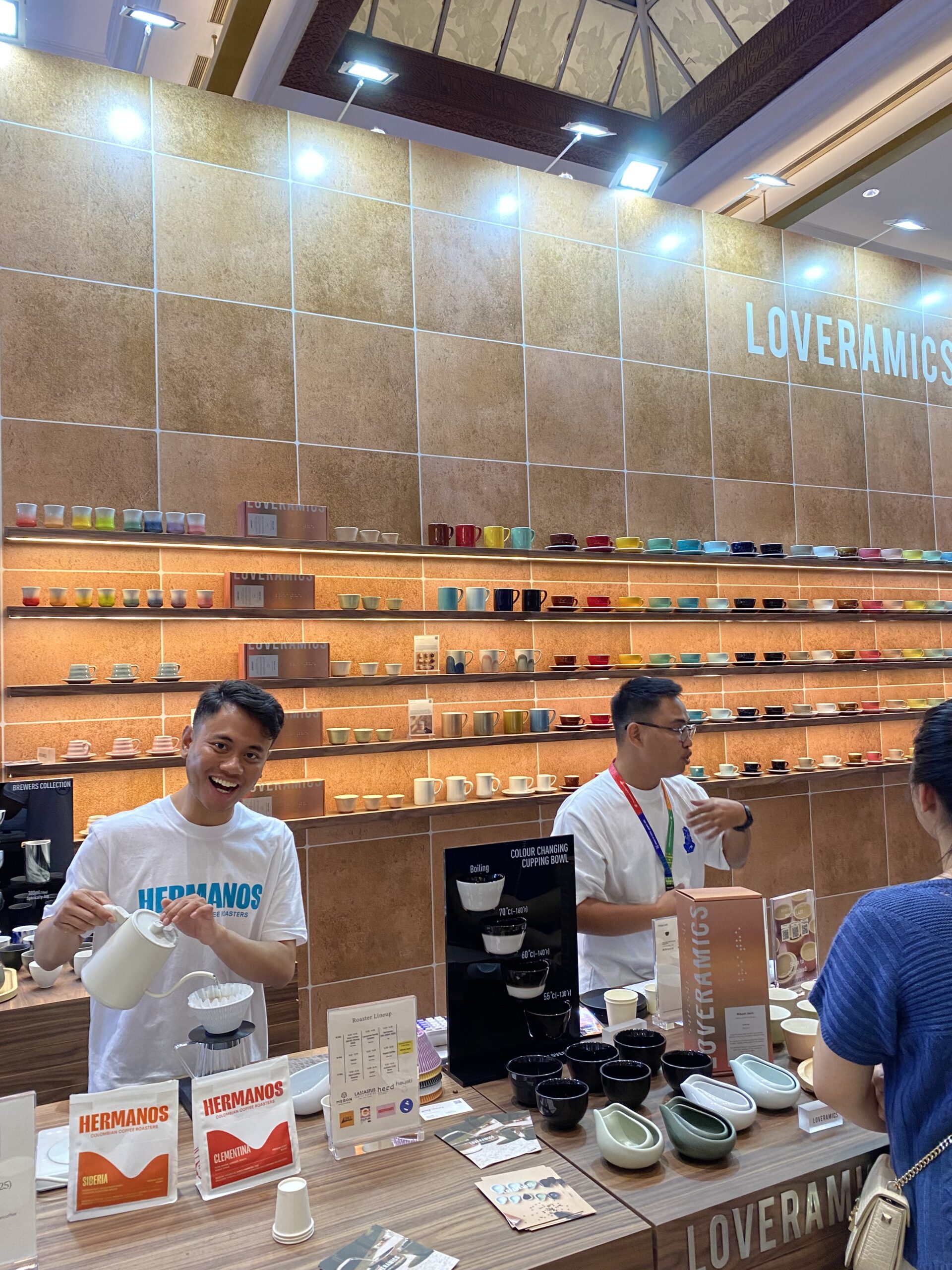
How do you stay motivated and inspired to keep improving your coffee-making skills?
Motivation comes from both ends of the value chain. At origin, tasting coffees and seeing the work producers put into every harvest inspires me to match their dedication on my end. It’s humbling. On the other side, competitions and community push me forward.
Preparing for the UK Brewers Cup forced me to refine every detail, my recipes, my storytelling, my sensory skills. It reminded me that improving isn’t just about brewing better, it’s about communicating. Coffee is endless. There’s always more to learn.
What are some common misconceptions about our industry that you’ve encountered, and how do you address them?
Coffee isn’t only about hospitality; it’s also a complex global supply chain. From farms and processing mills to exporters, roasters, and finally the customer, every step adds value and meaning. Recognising the bigger picture helps us appreciate and respect the product even more.
What are the current trends in cafes in your region? Are there any trends you promote yourself and would like to see more often in other places?
London’s coffee scene is always evolving. Recently, I’ve noticed more cafés are offering manual brews again, which is exciting because it engages customers differently.
In Indonesia, one trend that’s growing is coffee omakase, multi-course tasting experiences curated by the barista. Through Dawn, I’d love to introduce more storytelling-driven formats like that, where the coffee becomes an experience that creatively bridges farm and consumer.
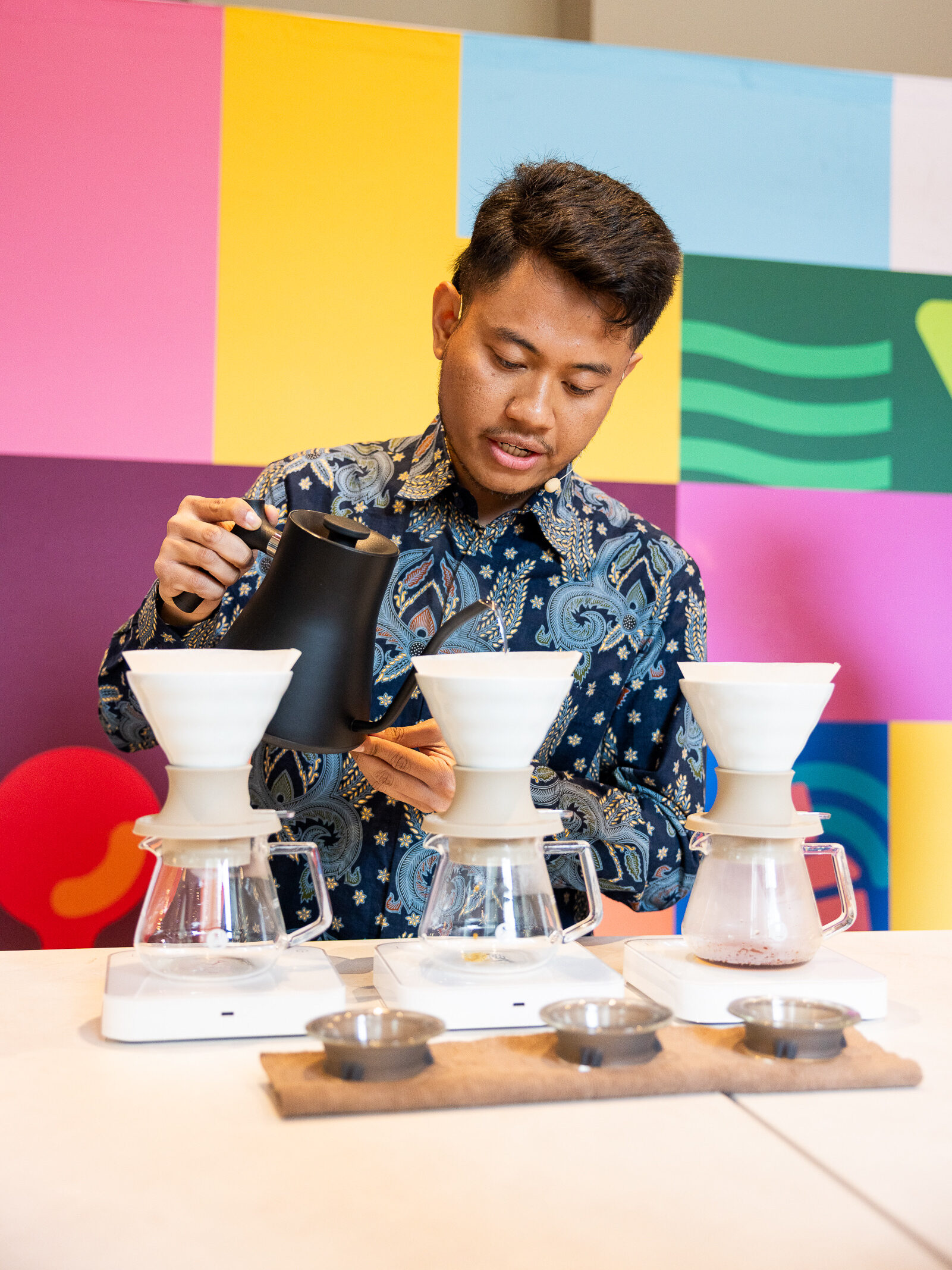
You have some amazing achievements in championships. Can you tell us more about them?
Thank you! Competing in the UK Brewers Cup 2024 was a surreal milestone for me. Honestly, I never thought I’d compete until I met Alex from Ireland, who told me about his routine at the Irish Brewers Cup finals. He reframed competition for me, not as an intimidating stage but as a game, one where the goal is simply to tick the boxes on the scoresheet.
I ended up blending Gesha and Red Bourbon from the same farm, Finca Anaya in Huila, Colombia, both washed coffees sourced and roasted by Hermanos. With just three weeks to prepare, I leaned heavily on my team for support, especially in shaping the script and structure.
On competition day, standing alongside some of the UK’s best brewers, I somehow found myself in the finals, my first-ever Brewers Cup, finishing 5th. It was a reminder that sometimes all it takes is saying yes, and figuring it out along the way.
Your open service felt very personal and emotional (in a good way!). What was the main message you wanted to come through?
For me, it was never about winning, it was about sending a message.
At first, we experimented with stories about farms and even about “home,” but they didn’t feel authentic. I wasn’t competing with an Indonesian coffee, so the farm narrative didn’t resonate, and the “home” story felt like it was written for me rather than by me.
Then one night, I admitted what I was really feeling at that time: heartbreak from a breakup. It was raw, present, and strangely aligned with the coffee I was using, long-lingering, floral, like a memory you weren’t ready to let go of. So I built my routine around that story.
It was vulnerable, but it felt real. On stage, I shared that story honestly, and for the first time, it felt like I was truly connecting. Coffee has this incredible ability to hold space for emotion, memory, and even healing. That’s what I wanted to show.
Yes, the story was true. And yes, I’ve moved on and I’m in the best place now. But I’ll always remember that moment, because while the heart can be manipulated, the palate stays true. And healing takes time.
What is in your opinion the most important thing to have in mind when you start to compete in coffee championships?
First and foremost, good coffee. At the end of the day, it’s not a hospitality or beauty contest; the quality in the cup comes first.
Beyond that, know your “why,” and study the scoresheet. Competition is a game, and the boxes are there for a reason. Focus your energy on what’s being evaluated rather than on distractions that won’t impact your score.
Finally, don’t do it alone. Surround yourself with a supportive team to help with preparation, feedback, and training. Having people who believe in you and keep you accountable makes all the difference.
What are the next championships you’d like to compete in?
One step at a time. If the timing, the coffee, and the message align, I’d love to compete again. But for now, my focus is on my work at Hermanos and on building Dawn Coffee to grow Indonesian exports.
Competition has given me a lot, but I don’t want it to take too much from me either. I genuinely believe you don’t need a title or a trophy to grow in this industry, you can make an impact while still enjoying the journey.
If there were one piece of knowledge about coffee you’d like everyone to know, what would that be?
Taste is king. What we believe today might evolve tomorrow, but as long as the taste is good, any theory or “rule” can be questioned. Coffee doesn’t have a fixed status quo; it’s always evolving, and that’s what makes it exciting.
What are your passions and hobbies apart from coffee?
Lately, I’ve been going to a lot of gigs, mostly rock. I grew up on Guns N’ Roses, Sum 41, Oasis, and The Killers; those bands still inspire me today.
I also love writing and teaching. From time to time, I give lectures on value chain management and entrepreneurship, which is a way to bridge my coffee journey with my academic background. Sharing knowledge is something I deeply enjoy.
What coffee challenges are you looking forward to? Any new projects or collaborations?
Through Dawn Coffee Curators, I’m working on building deeper relationships with producers in Java and Sumatra. We’re piloting microlots with full traceability, and I’m excited to bring them to UK roasters in our upcoming October shipment.
At Hermanos, we’ve just finished sourcing our lineup for the next container, also arriving in October, which will include some beautiful coffees perfect for the autumn and winter season.
On top of that, I’m also involved in Give Endlessly, and we’re planning our next charity event in collaboration with Allpress London in Dalston, again, in October. It’s shaping up to be a very busy month, but in the best way possible.

Quick Fire Questions for Rifqi Maulana:
Filter coffee or espresso-based?
Filter coffee.
Milk coffee or black coffee?
Black.
The most underrated coffee drink?
Dirty latte.
The most underrated coffee brewer?
Tricolate.
Which method to make coffee you use at home?
V60.
The number one place in Europe that every coffee geek should visit?
Motors Coffee in Paris, great coffee selection and I had the best banana bread of my life there!
Favourite city outside your own for a coffee tour?
Paris – an exciting, high-quality, and growing coffee scene!

